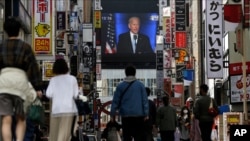A Joe Biden presidency is likely to involve a deeper U.S. engagement with Southeast Asia, some analysts say, offering trade for their pandemic-hit economies and security leverage against regional heavyweight China—but also bringing uncomfortable questions on rights and democracy.
Southeast Asia knows Biden from his time as vice president in the administration of President Barack Obama, whose “Asia pivot” lavished diplomatic capital and resources on a strategic trade and defense vision for the region aimed at expanding economies that are home to 650 million people and checking China's march.
President Donald Trump’s approach to the 10-member Association of Southeast Asian Nations has seen defense sales, bilateral trade deals and promises of support in the face of an increasingly assertive Beijing, which has ramped up its bases in the contested South China Sea.
Trump also brought threats to the same countries, however, over trade deficits. The sudden withdrawal from the Obama-era Trans-Pacific Partnership after years of talks on the world’s largest low-tariff trade zone left allies wondering whether the U.S. could still be counted on as a long-term partner.
Now, ASEAN leaders are expected this weekend to sign a rival trade deal, the Regional Comprehensive Economic Partnership, anchored by China.
Some analysts predict that under Biden, America will be a more visible ally.
“Biden will reconstruct US foreign policy in Southeast Asia,” said Ade M Wirasenjaya, who lectures on International Relations at the Universitas Muhammadiyah Yogyakarta, Indonesia.
“Biden has political insignia with Democrat and predecessor Obama. He will be more calm and build relationships in a multilateralist way than Trump.”
Biden—and his top officials—also will show up, said Emeritus Professor Carl Thayer of the University of New South Wales, in Australia.
“President-elect Biden has already proclaimed ‘we’re back!’ meaning that top U.S. officials will turn up for high-level meetings with their ASEAN counterparts,” he said.
Trump skipped several key ASEAN summits, while China routinely sends top leaders.
Trump’s trade war with China also left blisters across the region’s export-reliant economies—some countries benefiting from a shift of supply chains, others losing investment from battered Chinese firms as protectionist measures toxified the trade environment.
The projected change in the White House has been welcomed by ASEAN leaders, many stunned by America’s sudden retreat from leadership on major global issues like trade and climate change.
Thai Prime Minister Prayuth Chan-ocha, whose country is Southeast Asia’s second biggest economy and Washington’s oldest Asian ally, said he “looks forward to working closely” with the incoming president, while Halimah Yacob, Singapore’s president took to Facebook to praise the president-elect and his running mate, Vice President-elect Kamala Harris.
“This is the historic moment for women minorities in the U.S., and around the world,” Yacob said on Facebook.
Elephant in the room?
There may be awkward conversations, however, once Biden takes office in January.
Biden will “pay attention to issues related to human rights and democratic development, which has been overlooked by the Trump administration,” said Kavi Chongkittavorn, a Bangkok-based veteran diplomatic commentator.
Trump paid less public attention than his predecessors to pro-democracy movements and questions of human rights, dismaying activists from Thailand to Cambodia. Analysts say that served to embolden regional strongmen such as Philippine President Rodrigo Duterte and Cambodian Prime Minister Hun Sen, as well as the ex-generals who stack Thailand’s government, and even Vietnam’s communist leadership.
Kavis said Biden will be more attentive and “zero-in on Thailand and its future strategic role,” said Kavi.
Trade and security
While the TPP deal is unlikely to re-emerge as it was, Southeast Asian leaders who are meeting this week in Vietnam will be hoping for swift reassurances from a Biden administration on free trade.
Equally, they will be keen to have a reboot of the climate change agenda, which they see as integral to the future of a region hit by historic droughts and storms.
Their main concern, though, is the rapid advance of China. It is now the biggest trading partner with ASEAN and a military power with its eyes firmly set on dominating the South China Sea, as well as completing a lattice of debt-funded infrastructure projects to realize its Belt and Road Initiative ambitions.
Trump had promised to turn up the economic and military heat on China in a second term, offering Southeast Asian states—an area his administration defined as the Indo-Pacific—valuable leverage in their negotiations with their neighborhood superpower.
Biden will have to address the same concerns, experts say.
“No matter who runs the White House, there’s still an increasing convergence of strategic interests in the South China Sea and bilateral economic ties are still flourishing,” said Le Hong Hiep, an academic at the Contemporary Southeast Asia ISEAS – Singapore based Yusof Ishak Institute.
First, though, he will have to seize the chance to remake old friendships and show that America remains a long-term ally that will not divide and rule a Southeast Asian bloc already being fractured by China’s wealth and influence.
“Biden will become a strategic partner with ASEAN,” Wirasenjaya said, “particularly to reduce China's aggression in the South China Sea.”




